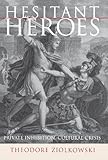Hesitant Heroes : Private Inhibition, Cultural Crisis / Theodore Ziolkowski.
Material type: TextPublisher: Ithaca, NY : Cornell University Press, [2018]Copyright date: ©2004Description: 1 online resource (184 p.) : 1 halftoneContent type:
TextPublisher: Ithaca, NY : Cornell University Press, [2018]Copyright date: ©2004Description: 1 online resource (184 p.) : 1 halftoneContent type: - 9781501711275
- 809/.93352
- PN56.5.H45Z56 2004
- online - DeGruyter
| Item type | Current library | Call number | URL | Status | Notes | Barcode | |
|---|---|---|---|---|---|---|---|
 eBook
eBook
|
Biblioteca "Angelicum" Pont. Univ. S.Tommaso d'Aquino Nuvola online | online - DeGruyter (Browse shelf(Opens below)) | Online access | Not for loan (Accesso limitato) | Accesso per gli utenti autorizzati / Access for authorized users | (dgr)9781501711275 |
Frontmatter -- Contents -- Preface -- Introduction: The Paradox of the Hesitant Hero -- 1. Aeneas, or Hesitation in Hesperia -- 2. Orestes, or Anguish inArgos -- 3. Parzival, or Silence at Munsalvaesche -- 4. Hamlet, orAnomy in Elsinor -- 5. Wallenstein, or Evasions in Bohemia -- 6. Wavering Heroes, from Scotland to Spain -- Conclusion: Continuities -- Notes -- Index
restricted access online access with authorization star
http://purl.org/coar/access_right/c_16ec
Why, Theodore Ziolkowski wonders, does Western literature abound with figures who experience a crucial moment of uncertainty in their actions? In this highly original and engaging work, he explores the significance of these unlikely heroes for literature and history.From Aeneas—who wavered momentarily before plunging his sword into Turnus's chest—to Hamlet, Orestes, Parzival, Wallenstein, and others, including Kafka's Josef K., Ziolkowski demonstrates that characters' private uncertainty reveals a classic opposition of binary forces. He describes how Aeneas, for example, was forced to choose between the ancient code of blood vengeance and the new civic virtues of law and justice. Ziolkowski asserts that the indecision of the characters reflects the tensions that authors observed in their own societies. Drawing on the insights of Hegel and Freud, he analyzes the ways in which these tensions represent turning points in cultural history. In stark contrast to Aeneas, Josef K. temporized for a year before his executioners thrust a knife into his heart. For Ziolkowski, the centuries separating Virgil and Kafka are ones in which the notion of the hero was transformed almost to the point of total inversion. He sheds light on this transformation and a corresponding change in literary form.
Mode of access: Internet via World Wide Web.
In English.
Description based on online resource; title from PDF title page (publisher's Web site, viewed 26. Apr 2024)


